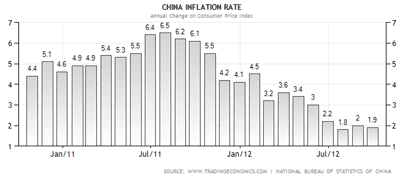It looks like QE3 has drawn some concern from Chinese leaders that it increases inflationary risks. Yet with 7.4%% growth and 1.9% inflation, China's concerns are a bit different than US concerns, observes Jim Trippon of China Stock Digest.
Although China is currently and has been dealing with the global economic slowdown, as have Europe, the US, and every other world economy, one of China’s main concerns is inflation.
This has always been on the minds of China’s policymakers, as it was fighting any possibility of inflation in its economy as recently as a year and a half ago with interest-rate increases.
Currently, however, the concern isn’t so much for its own economy, or at least its own economic policies causing or promoting the chance of inflation. Instead, China’s concern is what the rest of the world is doing.
The central banks, notably the European Central Bank have been dropping interest rates in Europe. In the case of the US, the Fed has been injecting easy money into the system along with keeping interest rates low. China has already spoken to and about Europe. Now it has concerns chiefly about the US and QE3.
Xinhua, China’s state news agency, revealed the remarks of People’s Bank of China Governor Zhou Xiaochuan, who said that central banks should “consider draining excessive liquidity,” which they’ve injected into the financial system, so as to “eliminate” pressure for inflation in the long run.
The third quarter of this year has seen central banks ease monetary policy in the US, England, Japan, and in Europe. While the moves have been to assist the flagging economies, growth has still been problematic, especially in Europe.
Still Wary
The easing measures have been said to help bolster business confidence, and in the US the economic recovery, though slow, continues to inch along.
Recent data out of China suggests that some of the further easings undertaken recently may have already helped push China exports to improve. The export trade had been particularly hard hit by the crisis in Europe, China’s major trading partner.
Still, China has undertaken more gradual policy easing and stimulus measures than those in the West, and it looks as though China will continue its careful, incremental approach while now keeping a keen eye for any effects of inflationary pressure from the recent easings in the West.
There are other potentially inflationary pressures that aren’t necessarily headline news. The swelling of China’s foreign reserves and its continued growth unabated could have had an effect on monetary supply. Foreign reserve growth, Zhou pointed out, has been blunted by the economic slowdown, so it still stands at $3.29 trillion.
One thing Zhou did not point out, however, was that this money doesn’t circulate in the Chinese economy. Policymakers in Beijing have been explicit that the foreign reserve won’t be used either to alleviate China’s internal economic imbalances, nor—in more famous exchanges last year—to ride to the rescue of the Eurozone during its debt crisis.
Simply put, China wasn’t going to throw its foreign reserves en masse into sovereign euro debt, though it had been a purchaser of some bonds, nor was it going to fling the money into the home stimulus pot either.
China made it clear its reserves are just that: reserves. So monetary supply will rise and fall via other means—more contolled means—by the central bank.
Although Zhou spoke and wrote about inflation, there is still the concern for the economic slowdown in China. The IMF and the World Bank both came out with recent forecasts which said that the risks aren’t over for China’s economy, and indicated that the possibilities are there for a longer and deeper growth slowdown.
That’s a caution that has been implicit in China, if not a worry. The feeling is that the world economies and policymakers are dancing on a large, connected sheet of ice, thinner in some parts than in others.
What China’s leaders really don’t want is for their careful work on their own economy to be ruined by someone smashing through the economic ice somewhere else, by policies that could plunge all the economies into deeper, colder water.
Unfortunately, policy reverberates. All the global easing can at some point melt the connected sheet of ice with white hot inflation, and that could be a runaway event with even worse consequences than the economic slowdown.
Subscribe to China Stock Digest here...
Related Reading:











